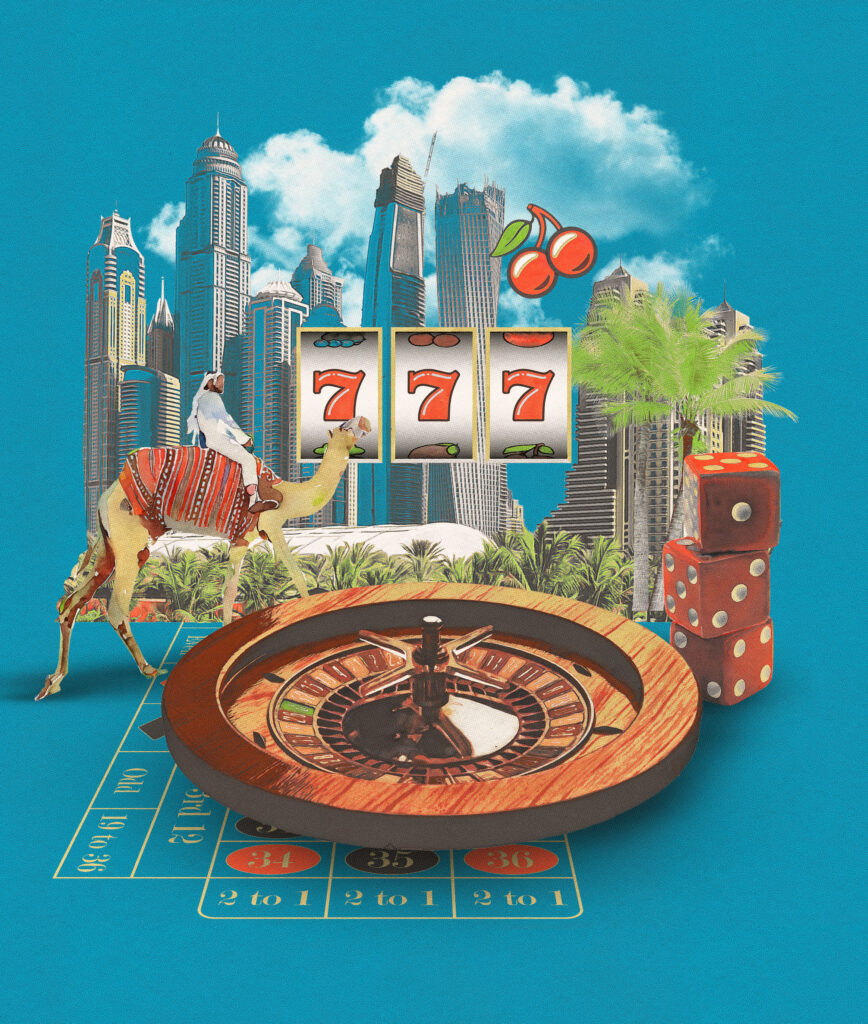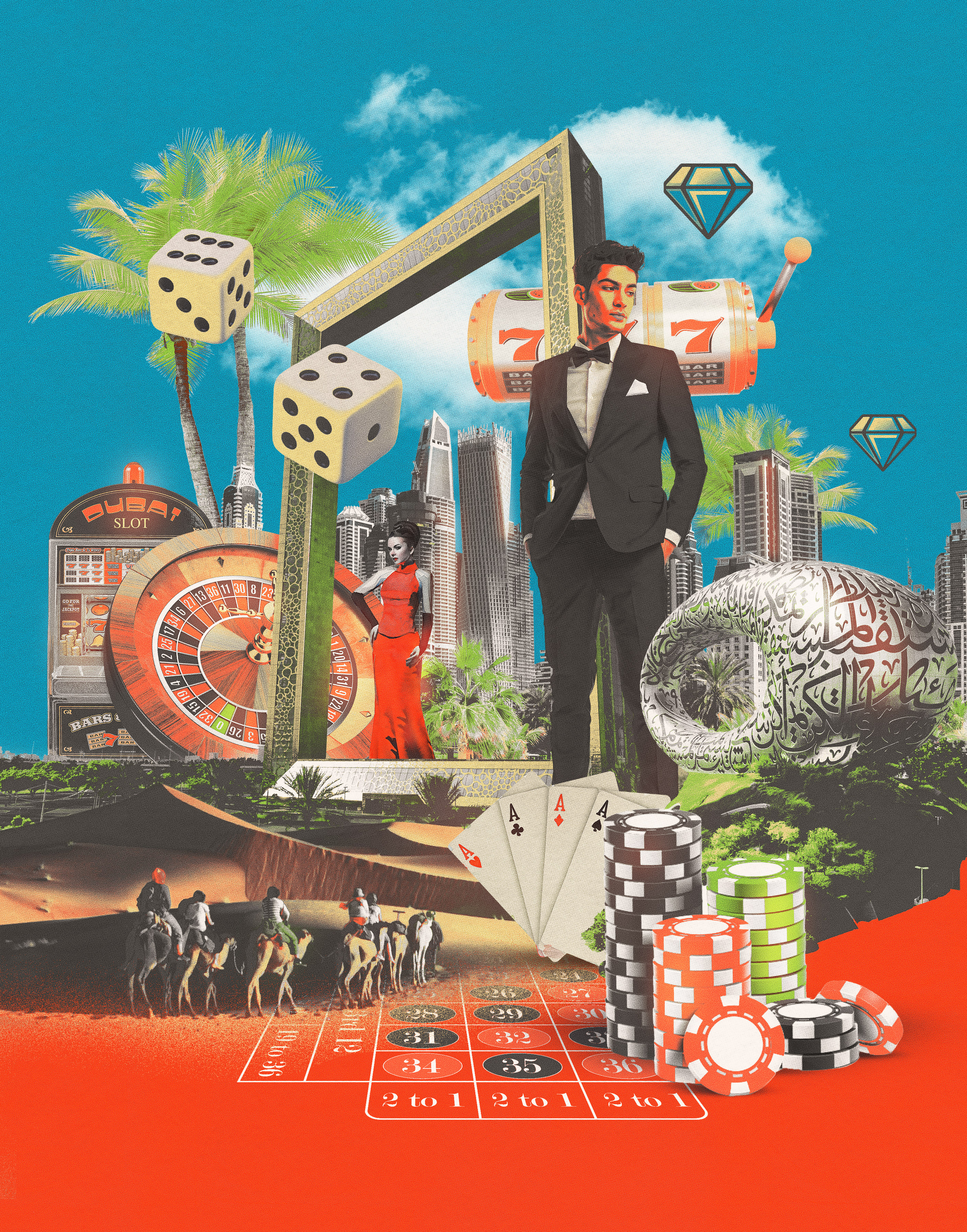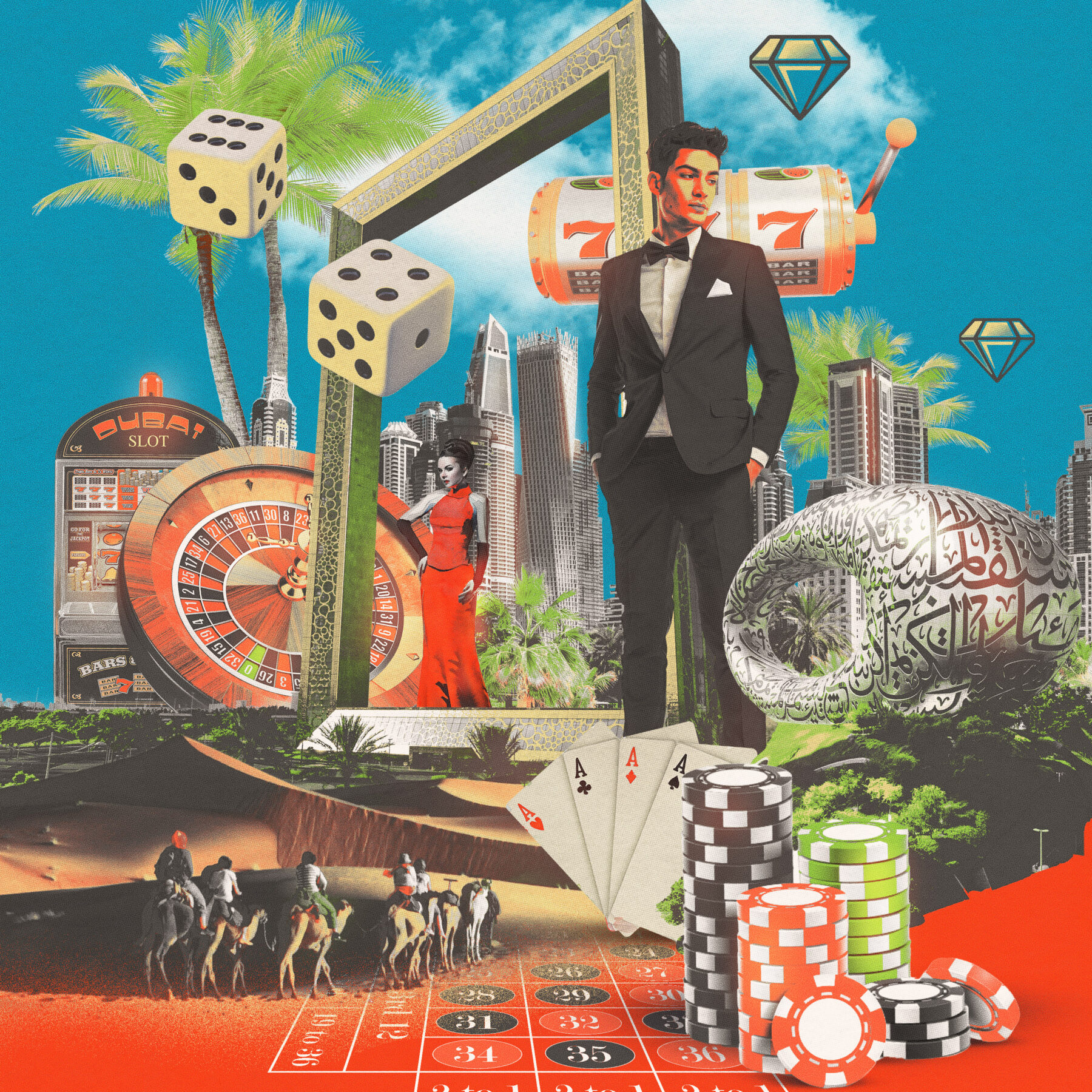The United Arab Emirates is a world of contradictions. The oil-rich country in the Gulf peninsula is a kaleidoscope of cultures, traditions, nationalities and quirks unique to one of the richest places in the world. In no particular order, here are some of the things you can find there, most of them in its most popular emirate, Dubai, and featured in Netflix’s hit series Dubai Bling: penguins, on an indoor ski hill; an awe-inspiring 10-million-litre aquarium on display at the Dubai Mall, the second largest mall in the world; New Year’s fireworks displays that routinely shatter world records; and bespoke luxury smartphones adorned with diamonds and gold, which go for over 300,000 AED, or about US$85,000. Even the police drive around in luxury—their fleet of patrol cars includes multiple Mercedes models.
But even in this seemingly limitless place of pleasure and luxury, there are still restrictions. Despite its global reputation as a fantasy-land for the rich, the U.A.E. is still an Islamic country with deeply conservative values. It’s home to some of the most pristine mosques in the world, like the Sheikh Zayed Grand Mosque in the capital emirates of Abu Dhabi—the largest mosque in the U.A.E.—where Rihanna was notably expelled in 2013 after an unauthorized impromptu photo shoot that offended local sensibilities. In town to perform at the man-made Yas Island, the pop star posed for photos wearing her signature red lipstick, prompting authorities to ask her to leave due to her “inappropriate pictures” that “did not comply with terms and conditions” of visits to the mosque.
So yes, you can indulge in a well-worn Dubai tradition of bottomless weekend brunches that last all day and perhaps spill over into the early hours of the next, but you can also be arrested for drinking in public, indecent clothing or public displays of affection. Until 2023, it was illegal for unmarried couples to cohabitate or share a hotel room, though a recent federal law amendment has now decriminalized it. It’s worth noting, however, that many of the newly liberalized laws, and even long-standing ones like who is legally allowed to drink alcohol, apply to “expats only,” rather than to the local and Muslim population.
“It’s a world made for the playground of the rich,” says Khaled Abou El Fadl, a professor at the UCLA School of Law. Indeed, the richest people in the world have made the U.A.E. an oasis of luxury and excess, whether through indulging in high-end shopping and luxury cars or setting sail on lavish yachts to nearby islands. The distinctive diamond sheen of the Emirates has been referenced in the lyrics of a slew of rappers, including Drake.
This liberal-conservative mix is a defining characteristic of the country—and one of the keys to its worldwide, global appeal.
“The U.A.E. is almost like sort of southern Spain, but in the Middle East,” says Kristian Ulrichsen, author of The United Arab Emirates: Power, Politics and Policy-Making. “Though once you start scratching the surface, it’s quite different. But that’s the image that they’ve been very successful in selling.”
The gleaming reputation of the U.A.E. is largely derived in the dazzling headlines generated from its most famous emirate, Dubai, and its capital city and business centre, Abu Dhabi. But last fall, in October 2024, a smaller, traditionally quieter and sleepier emirate made international headlines with news that a new resort slated to open in 2027 in Ras Al Khaimah, the fourth-largest and northernmost emirate, would be home to the country’s first-ever casino. The Wynn Al Marjan resort, which will be housed on Dream Island, one of the four man-made islands that make up the man-made Al Marjan Island, will include 1,542 rooms and suites, including 22 private villa estates, a 15,000-square-metre shopping esplanade, a five-star spa and more.
The construction of the resort marks a pivotal moment in the U.A.E.’s economic and tourism strategy, signalling a noticeable transformation toward the integration of high-end gaming within its hospitality sector. The US$5.1 billion resort positions Ras Al Khaimah as a burgeoning rival to global gaming destinations. With construction advancing rapidly, completion is projected for 2027.
[Gambling] has always been haram, and it’s haram right across a number of countries in the Gulf. This is a sea change
Sandra Mottoh, Chief Compliance officer of responsible gaming mena
Beyond the immediate economic benefits, including an influx of high-net-worth tourists and a surge in job creation, the project is expected to have broader socioeconomic ramifications. However, the introduction of regulated gaming in the U.A.E. represents a fundamental shift in policy, necessitating new regulatory frameworks and oversight mechanisms to balance economic incentives with cultural considerations. The real estate sector is already feeling the ripple effects, with properties near the development experiencing heightened investor interest and price appreciation.

Wynn’s foray into the U.A.E. is more than just a hospitality venture—it is a test case for how gaming can be integrated into the region’s evolving economic landscape. As Ras Al Khaimah positions itself as a luxury destination, questions remain about the long-term infrastructural and social impact of this transformation: Will this model spur similar developments in other emirates? How will it reshape the region’s approach to tourism and foreign investment? The answers may define the next chapter of the U.A.E.’s diversification strategy.
The introduction of an “integrated resort” including a casino is an eyebrow-raising move, given that gambling is explicitly prohibited in Islamic and local laws. Under current U.A.E. federal law, gambling is illegal and punishable by up to two years in jail, with fines ofupwards of 50,000 AED, or nearly US$14,000.
“It has always been haram, and that remains the case across much of the Gulf. What we are witnessing now is a genuine sea change,”says Sandra Mottoh, chief compliance officer of Responsible Gaming MENA, using the Arabic word for “forbidden” in Islam. The firm’s role is to ensure “integrity and responsibility” within the gaming sector in the U.A.E., to address people’s worries about the move into gambling, and render it socially acceptable.
The sea change is being led by the recently minted General Commercial Gaming Regulatory Authority (GCGRA). Established in 2023, it’s the agency responsible for regulating and overseeing commercial gaming in the U.A.E. Headquartered in Abu Dhabi, the GCGRA is the only authority that can regulate, license and supervise all commercial gaming activities and facilities in the country.
“The regulator is brand new,” Mottoh says. “They are building the framework in real time, drafting rules as the sector takes shape, assessing how it is received and refining it as they go. They are introducing something entirely unprecedented in this region, and part of that work is helping the wider community understand it, get comfortable with it and ensure it is delivered responsibly.”
Mottoh emphasizes the importance of safeguards to prevent harmful gambling behaviours, questioning how best to implement them. “How do we make sure that when someone is playing beyond their means, or in a way that is harming them, there are mechanisms in place to intervene? From a responsible gaming perspective, there are multiple controls we can implement, and we are already doing that.”
Mottoh’s priority is to centre the “responsible” part of “responsible gaming,” including particular measures that include anti–money laundering initiatives, ensuring that advertising for commercial gaming does not target children and initiating protocols to protect individuals from the addictive nature of some of these games. “What is different here is that responsible gaming is not an afterthought. It is being embedded from day one,” Mottoh says. TheU.A.E. has the luxury of learning from other markets.
There is much hanging in the balance for getting this move just right. The U.A.E. is home to a small native population: Emiratis, the locals, make up roughly only about 10 per cent of the population, while the other 90 per cent is made up of “expats.” This includes those from Global North countries like the United States, United Kingdom, Canada and Australia, as well as migrant workers who moved from places like India, Bangladesh, Sri Lanka, Pakistan and the Philippines, and who make up the overwhelming majority of workers in construction and service jobs.
“The Emirates is a very odd example because it’s a country where 90 per cent of the population is actually not native,” said UCLA professor Abou El Fadl. “Out of this minority, it’s the elite that actually rules the government, and the ruling elite that governs is a minuscule minority.”
What that means is that governing the Emirates—and creating rules for this global hub that is home to 200 nationalities and booming tech, real estate and luxury industries—is delicate.
“The Emirati authorities are sensitive to the issue of national identity. Having so few Emiratis surrounded by so many non-Emiratis is something that often is very, very sensitive to talk about,” Ulrichsen says. This sensitivity, he notes, has made it so that the oil-rich Gulf state see-saws between global and local tastes. “They do feel like they’re kind of walking a tightrope trying to balance the desire to be attractive on a global level with the fact that they are also custodians of a much more conservative, religious set of regulations,” he says.
One manifestation of this delicate equilibrium lies in accurately naming this historic shift—one that defies the conservative grain of the Gulf state. Though Wynn Al Marjan is slated to be home to a dizzyingly large 194,000 square feet of casino infrastructure, and is the sole recipient of the necessary land-based commercial gaming licence, according to official messaging, visitors will be engaging in “gaming.” Similarly, the G-word in the title of the regulatory body, the General Commercial Gaming Regulatory Authority (GCGRA), refers to it as a “gaming” authority—not the other, verboten G-word: “gambling.”
Mottoh doesn’t expect that to change.
“The other G-word simply is not part of the conversation,” Mottoh says. “We do not use it, and that is intentional. We operate within an Islamic framework, and that cultural foundation is not going anywhere.”
For Ulrichsen, the use of “gaming” instead of “gambling” is the Emirates’ way of softening the significance of the move for the conservative country and region.

“The naming of this as ‘gaming’ is part of trying to manage that sensitivity, and maybe to gradually introduce resort-style casinos—not all at once, but to get people slowly accustomed to the idea that there’s going to be a sort of Las Vegas–style resort in one of the Emirates,” he says.
Robert Mogielnicki, a senior resident scholar at the Arab Gulf States Institute in Washington, agrees that the “gaming” label is a way for the change to draw less attention to the controversial move in a conservative region. “‘Gaming’ seems to entail fewer sensitivities.”
The “linguistic games” to manage sensitivities are not fooling Abou El Fadl, a leading authority on Shari’ah, Islamic law and Islam. “It’s gambling. Everyone knows what it is. I think that governments in the Middle East chronically think their people are stupid, and treat their people as if they’re stupid. And people are not that stupid.”
Some analysts see the U.A.E.’s foray into gambling, or gaming, as the latest step in the ongoing competition between the U.A.E. and Saudi Arabia. The Saudi kingdom has also begun to modify its once deeply conservative and strict traditions: Women, previously banned from operating vehicles, can now get behind the wheel and drive freely. Until recently, men and women could not mix in public, and religious police roamed malls and public spaces to surveil and discipline women for not being appropriately covered. Now the Kingdom has become home to significant music and culture events, including the star-studded Red Sea Film Festival, for example, and hosts concerts by local Saudi and Gulf artists as well as U.S. performers like Nelly.
Dubai has begun to feel the impact of the escalating economic competition with Saudi Arabia
Najah Al-Otaibi, middle east expert
Saudi Arabia is also working toward ambitious development goals like Vision 2030, a major plan to diversify the Saudi economy by reducing its reliance on oil, and introducing economic, social and cultural reforms. One of its most aggressive and controversial plans has been the creation of Neom, an in-progress US$500 billion carbon-neutral future megacity that has been plagued by ballooning costs, significant delays and migrant worker deaths.
“Dubai has begun to feel the impact of the escalating economic competition with Saudi Arabia,” says Najah Al-Otaibi, a London-based Middle East expert, of the most famous of the Emirates. In fact, Dubai often is referred to as a stand-in for the entire U.A.E. on the global stage. “It is completely reasonable for a city like Dubai, in which its largest single source of income after oil exports is tourism, to try to navigate unconventional businesses to boost its attractiveness to tourists, even if it means modifying their Islamic traditions.”
There’s also another point of comparison between the two nations: increasing attempts to “soften” their reputations on the international stage. According to Ulrichsen, the Kingdom is engaging in e-sports “to change people’s opinions and perceptions, to make people think that the Saudi Arabia you see today is not the Saudi Arabia you thought you knew 20 years ago.”
Critics say the Kingdom’s interest in gaming and e-sports amounts to “sportswashing”: a way to clean up their reputation on the international stage amid widespread criticisms of human rights abuses in the country, including the highly public murder of Saudi journalist Jamal Al Khashoggi in 2018. But there’s no denying the traction it’s making. According to PricewaterhouseCoopers, Saudi Arabia is quickly becoming a global player in gaming and e-sports, boasting a whopping 23.5 million gamers—around 67 per cent of the population. It’s also home to the Esports World Cup and the upcoming Olympic Esports Games in 2025.
That could be another explanation for why the U.A.E. has decided to enter into the world of gambling, despite the risks. “The U.A.E. realizes that this is going to be a serious competition, but I think they feel they have not just a head start, not just the kind of economies of scale, but enough of a global soft power base that they can manage it. And ultimately, for most people from the West, if they’re going to go to the region, they’ll probably want to go to Dubai or Abu Dhabi, not to Saudi Arabia,” says Ulrichsen. “The U.A.E. in general has this global soft appeal, where the Saudis still don’t have that, although they are trying to change that by getting people like Cristiano Ronaldo to send messages on Instagram to half a billion followers about how amazing the life is in Saudi Arabia.”
It’s too early to confirm whether the Wynn Resort will host games of blackjack, poker and baccarat. Mottoh says the regulator has been “very tight-lipped” around the specifics of the games that will be on offer at the casino, though she anticipates that it will be open only to tourists initially. But one thing that Mottoh says is clear is the U.A.E. and regulator’s commitment to making the foray into gaming a responsible one. “That is exactly why I chose to get involved,” she says ofworking with Responsible Gaming MENA.
Get the
Three from 3
newsletter
Join our global community of sharp, curious thinkers to receive a carefully curated email of the three most important things to read, see and do this week.
Listen and learn.
Tune into Third Culture Leaders, a podcast hosted by our co-founder and publisher, Muraly Srinarayanathas.
Explore how leaders skillfully navigate multiple cultural landscapes, leveraging their diverse backgrounds to drive innovation and change.
“There will always be revenue, that is not in question,” Mottoh says. “But the real issue is how that revenue is generated. You can design a gaming ecosystem that puts responsibility at the centre, or you can focus purely on profit. Without strong protections, people are vulnerable to harm, and addiction is a very real risk if those controls are not in place.”
These assurances are cold comfort to Abou El Fadl, who calls this move toward gambling “a model of fanatic Westernization.”
He says, “Gambling is a huge social ill. It’s opening up a world of social hurt. It’s a sort of godless capitalism, where profit is the highest value.”
Wynn Resorts did not respond to interview requests, but in 2025, its CEO said that the Al Marjan resort with its casino will be a “must-see” destination, and Mottoh has high hopes for what’s to come.
For her, this move is a sign that “the U.A.E. is open for business, and when people come here, they expect the best. Whether it is the tallest building, the desert or the hospitality, the standard is always excellence. That same mindset is being applied to gaming.”

